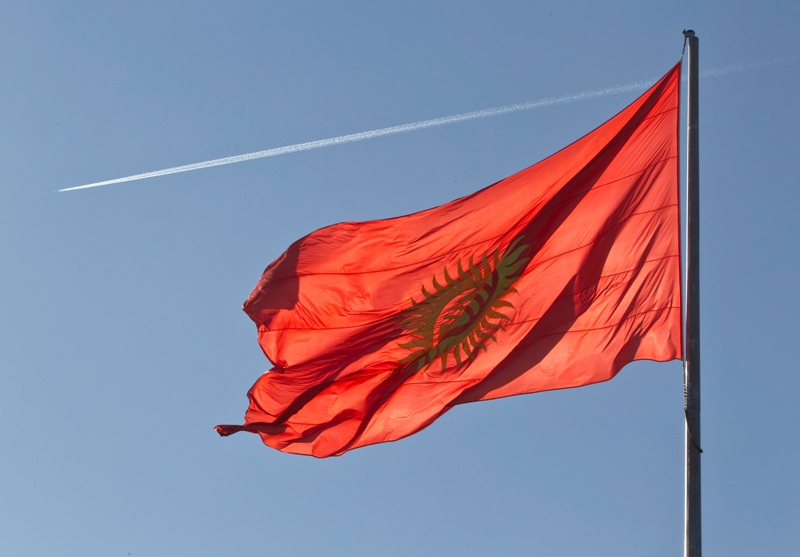The IPI global network today condemns the prison terms handed to two journalists in Kyrgyzstan who worked with media projects linked to Kyrgyz investigative journalist Bolot Temirov, who was forced into exile in 2022.
The two journalists, Mahabat Tajibek Kyzy and Azamat Ishenbekov, were sentenced to six and five years of prison, respectively, on charges of “calling for mass riots”. They were initially detained in an unprecedented wave of arrests on January 16, which targeted in total 11 media workers who had at some point worked with media projects led by Temirov.
Two more journalists, Aktilek Kaparov and Ayke Beshekeyeva, were sentenced to three years of probation. The seven remaining media workers who were arrested in January were found not guilty and released.
Arrests followed investigation into misuses of public funds
Temirov has said the charges against the 11 journalists were likely related to an investigation that Temirov Live published in late December 2023 into the alleged misuse of funds by Interior Minister Ulanbek Niyazbekov.
Authorities made the arrests the next month, claiming that unspecified articles published by several independent publications, namely Temirov Live, Ayt Ayt Dese, Politklinika.kg and Archa Media, contained calls for the use of violence. However, investigators did not explain the link between the arrested journalists and the content produced by these outlets, and most of those arrested said they had no relation with these outlets’ publications.
All 11 of the arrested media workers are current or former collaborators of Temirov Live, suggesting a link to the outlet’s work. Temirov has rejected the claim that investigations had contained a call to riots.
“Our authorities have taken off their masks. If before this [verdict] they were still sitting in two chairs and claiming at the international level that there is freedom of speech and democracy in Kyrgyzstan, now they no longer have any moral right to do this. Today is a historical day when dictatorship and tyranny officially took shape in our country,” Temirov said in a comment provided to IPI after the announcement of the verdict.
In May, Bolot Temirov reported that his wife, Mahabat Tajibek Kyzy, who is among the detained journalists, had been beaten while in custody. Authorities reportedly also threatened to strip the couple of their parental authority and place their 12-year-old son in a foster home, before agreeing to return the child’s documents to his grandmother. Kyrgyz authorities have rejected claims of wrongdoing against Temirov’s wife and son.
Authorities also repeatedly rejected the claim that the 11 journalists had been wrongfully arrested. Interior Minister Ulanbek Niyazbekov claimed in April that only two of them were journalists, and added that “the other nine are bloggers [who] only finished high school, do not know journalism and its rules, and being uneducated they spread false information and sow chaos”.
In September, Kyrgyz president Sadyr Japarov also said that those arrested “were paid to spend time on social media and spread false messages [in which they] called for riots”.
Journalism is not a crime
“IPI has called for the release of the 11 Kyrgyz journalists ever since they were first arrested in January,” said IPI Interim Executive Director Scott Griffen. “Today, we repeat this demand again and call on authorities to drop what clearly appears to be a politically motivated prosecution.”
He added: “Journalism is not a crime, and watchdog reporting on those in power is an essential component of investigative journalism. Such watchdog reporting cannot be equated with a call for riots. If Minister Niyazbekov believes that media have published false information about him, he has the option under Kygyz law to file a civil lawsuit for defamation.
“We urge Kyrgyzstan to recommit to upholding press freedom in the country and allow journalists to do their jobs freely and safely.”
At the time of their arrests, Kyrgyzstani media listed the detained journalists as Makhabat Tajibek Kyzy, Sapar Akunbekov, Azamat Ishenbekov, Saipidin Sultanaliev, Aktilek Kaparov, Tynystan Asypbekov, Maksat Tajibek Uulu, Joodar Buzumov, Jumabek Turdaliev, Aike Beyshekeeva and Akyl Orozbekov.
Long seen as a beacon of hope for freedom of the press and civil liberties in Central Asia, Kyrgyzstan has become more dangerous for journalists and political activists since the election of President Sadyr Japarov in 2021. In September, authorities put forward politically motivated accusations to block access to Kloop.kg, a major independent news outlet which won the IPI-IMS Free Media Pioneer award in 2024. In August, the Supreme Court of Kyrgyzstan approved a request filed by the country’s Ministry of Culture and liquidated one of Kloop’s legal entities in Kyrgyzstan.



